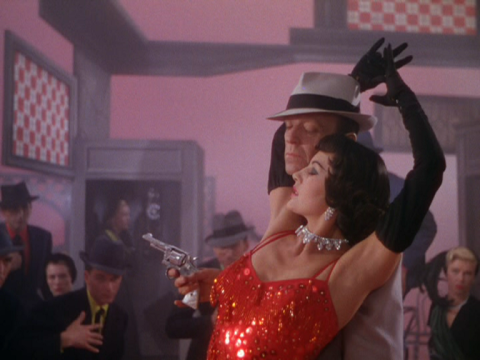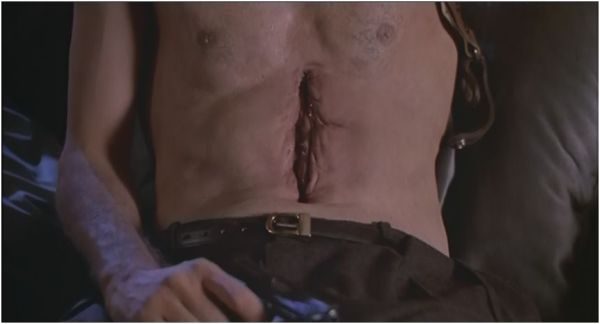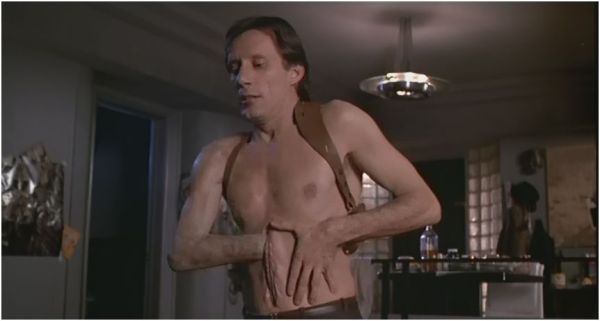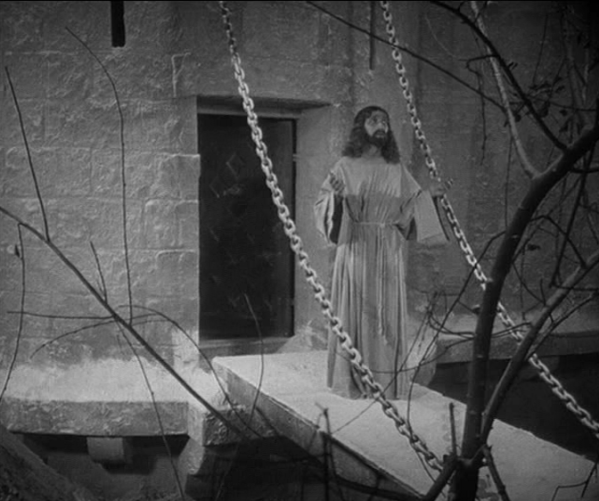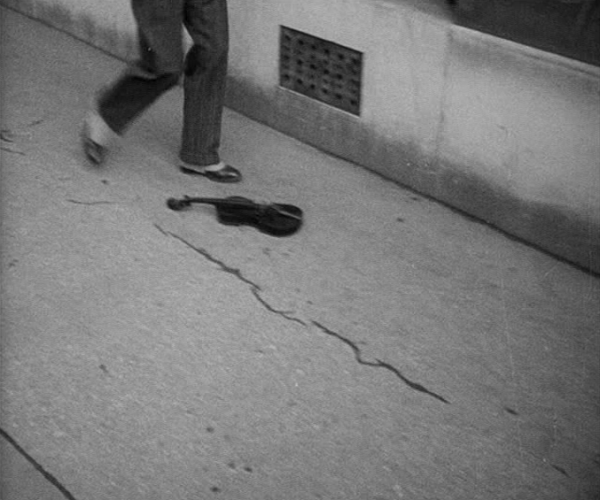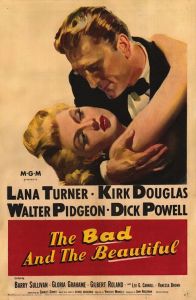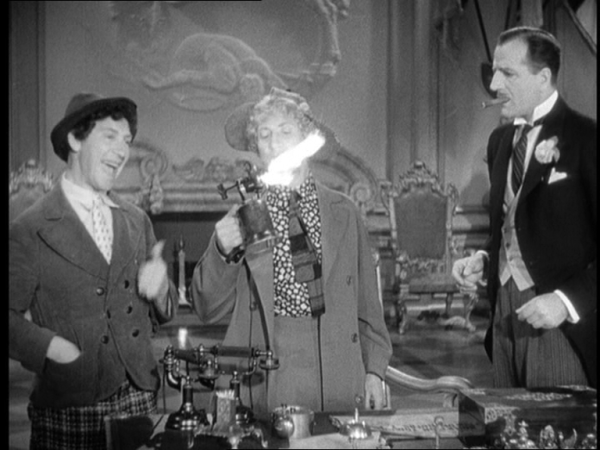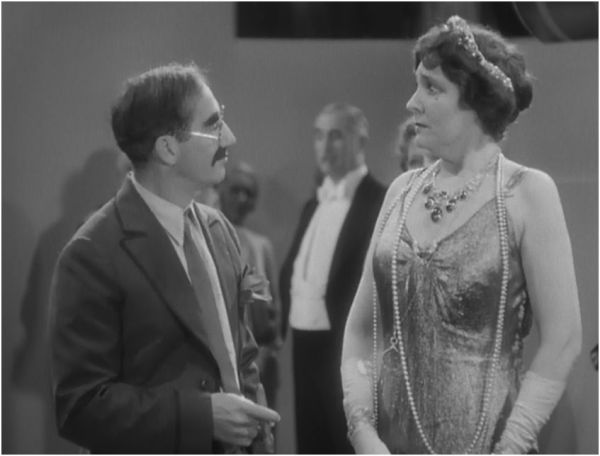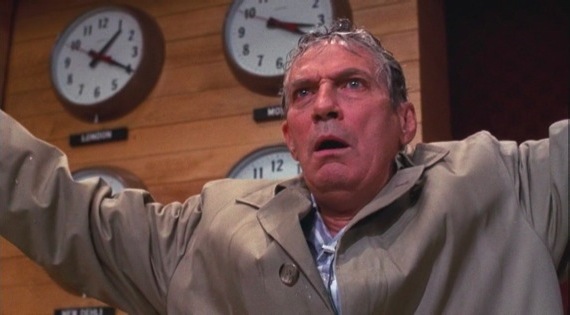Screen Odyssey has moved
Screen Odyssey has moved to screenodyssey.wordpress.com and we’re in the process of revamping. We hope you’ll join us at our new home.
The Cook, The Thief, His Wife and Her Lover
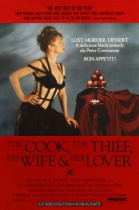 800. The Cook, The Thief, His Wife and Her Lover
800. The Cook, The Thief, His Wife and Her Lover
Written and directed by Peter Greenaway
1989, UK/France
Reviewed by Rachel
First viewing
Synopsis:
Georgina Spica (Helen Mirren) is the sophisticated wife of Albert (Michael Gambon), a sadistic restaurant-owning gangster. During yet another rowdy evening meal with Albert and his gang, Georgina spots gentle diner Michael (Alan Howard) amongst the usual rabble. Georgina and Michael quickly start a passionate love affair within the restaurant, right under the nose of her violent husband. The affair is kept secret by the sympathetic cook, Richard Borst (Richard Bohringer), who is well aware of the terrible abuse Georgina suffers at the hands of Albert. But how long will it be before Albert finds out about Georgina and her lover?
Thoughts:
I was the beau ideal of the morbid young aesthetical,
To doubt my inspiration was regarded as heretical~ Act II, Patience – Gilbert and Sullivan
The Cook, The Thief, His Wife and Her Lover is a conundrum for the brain and a feast for the eyes, although the visuals are not always agreeable. Rotting animal carcasses and appalling human behaviour are blended in with the stunning colours of the costumes and affluent sets. Beauty and ugliness.
The (comparatively) simple storyline of an abused, unhappy wife finding comfort in an affair with an intelligent and loving man is beefed up by many visual and plot-based allegories involving the characters, their surroundings and the zeitgeist of Britain in the late 1980s. When a film is so heavily aesthetic, it is sometimes difficult to look at it objectively without sounding like it has gone straight over your head with an unpleasant whooshing sound. So, as this is a light ‘opinion’ blog, I’m not going to go into those elements. It’s worth a view to form an opinion for yourself but I personally wasn’t interested enough to go beyond the ribbons and bows.
Fascinating fact: The costumes for The Cook, The Thief, His Wife and Her Lover were designed by Jean-Paul Gaultier
The Band Wagon
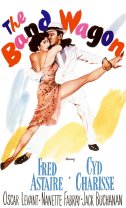 254. The Band Wagon
254. The Band Wagon
Directed by Vincente Minnelli
Written by Betty Comden and Adolph Green
1953, USA
IMDB | allrovi
Reviewed by Ally
Umpteenth viewing
Synopsis:
Tony Hunter (Fred Astaire) is a former musical star whom the general public now considers passé. Married writing partners Lester and Lily Marton (Oscar Levant and Nanette Fabray) plan Tony’s comeback by casting him in their latest stage musical, The Band Wagon; a lighthearted story about a children’s author who writes lurid crime novels on the side.
Tony struggles to connect with his balletic costar Gabrielle Gerard (Cyd Charisse) and director Jeffrey Cordova (Jack Buchanan), a dramatic sensation who decides to stage the play as a modern retelling of Faust. When the show inevitably flops, the diverse cast and crew must pull together to salvage it.
Essential Scene:
The final number of the revamped show is the Girl Hunt, an epic production in which Tony plays Rod Riley, a Mike Hammer-esque detective on the hunt for a murderer and a beautiful blonde played by Gabrielle. On his search he encounters a brunette femme fatale, also played by Gabrielle, and several violent gangsters. The sequence is narrated in hardboiled style by Tony.
The Girl Hunt reaches its climax in Dem Bones Cafe, a seedy bar where each customer has their own stylized dance. Detective Riley meets the seductive brunette again, and the pair share the best dance of the entire film. The sequence has proved highly influential, acting as the inspiration for Michael Jackson’s Smooth Criminal video.
Thoughts:
The Band Wagon was the first Fred Astaire film I saw, and I immediately thought he was wonderful. Having now seen dozens more of his movies, I feel a little disappointed upon revisiting The Band Wagon. The plot is admittedly sturdier than Astaire’s farces of the 1930s — in that it couldn’t be undone by one character correcting one misunderstanding — but the song and dance routines (the Girl Hunt aside) lack the magical quality that Fred at his best possessed. I’m grateful to The Band Wagon for introducing me to Fred Astaire a few years ago, but I won’t often revisit it now I’ve seen what he could achieve with Ginger Rogers.
Videodrome
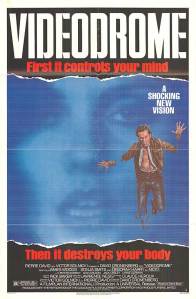 695. Videodrome
695. Videodrome
Written and directed by David Cronenberg
USA, 1983
IMDB | allrovi
Reviewed by Rachel
First viewing
Synopsis:
Max Renn (James Woods) is the CEO of a small, dodgy cable TV station that specializes in explosive material such as gratuitous violence and softcore pornography. The network is on the lookout for something new and sensational to boost their falling ratings until, using his pirate satellite dish, Max’s colleague comes across Videodrome; a supposedly staged snuff programme from Malaysia in which someone is filmed being savagely beaten to death. Max finds himself in great danger as he delves deeper into Videodrome and finds that it’s far more sinister than he anticipated.
Essential Scene:
Max has been given a videotape by way of “meeting” Videodrome’s creator, Brian O’Blivion (Jack Creley), for the first time. As he views the tape, Max uses a gun to scratch at a vertical scar on his stomach.
Brian O’Blivion: I think that massive doses of Videodrome signal will ultimately create a new outgrowth of the human brain, which will produce and control hallucination to the point that it will change human reality. After all, there is nothing real outside our perception of reality, is there? [Laughs] You can see that, can’t you?
The TV turns itself off. Max looks down at his scar, which has now turned into a gaping, pulsating hole. Max sticks his hand inside the orifice while still holding the gun; he digs in so deeply that his hand is no longer visible.
Max struggles to remove the hand that is lodged in his torso. When he finally pulls his hand free, he is no longer holding the gun. Panicked, he looks back at his stomach to see that the wound has disappeared, and his long, vertical scar has returned.
Thoughts:
One horror genre that I’ve always found very effective is the psychological thriller, as the fear of becoming unbalanced is one that we can all relate to. However, Cronenberg has always gone that bit further and created a sort of body horror; a physical, fleshly amalgamation of guts, blood and gore. This is disgusting and disturbing but also very clever.
Cronenberg is utilising something that, in reality, can cause a lot of trauma; the human body itself. It can be terrifying when a body is doing something we cannot control, and it is equally as terrifying when we see parts of it that we are not normally meant to see. Cronenberg bombards us with both of these aspects without resorting to the horror staple of having a weapon-wielding homicidal maniac being the cause of the gore — and if a person is the cause, the method of murder is much more complex than that.
While this concept is used well in Videodrome, and I admire it purely for that feat as it was made before CGI, I found that the film itself was a little muddled. I was intrigued until the feel seemed to completely change halfway through. It was the equivalent of a hardcore version of Network turning into an early prototype for The Matrix. Not such a bad thing for many potential viewers, but not entirely to my taste.
L’Âge d’Or
48. L’Âge d’Or (The Golden Age)
Directed by Luis Buñuel
Written by Luis Buñuel and Saldavor Dalí
France, 1930
IMDB | allrovi
Reviewed by Ally
First viewing
Synopsis:
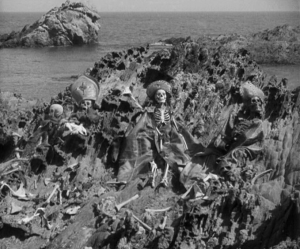 A Surrealist film comprising a series of vignettes. The film begins with footage from a documentary about scorpions. It then cuts to a man who sees a group of “Majorcans” (actually bishops) on a beach. He rallies a small group of wounded soldiers to attack them, but they collapse one-by-one along the way. A large group of wealthy people arrive by boat to greet the Majorcans, who have become skeletons in vestments.
A Surrealist film comprising a series of vignettes. The film begins with footage from a documentary about scorpions. It then cuts to a man who sees a group of “Majorcans” (actually bishops) on a beach. He rallies a small group of wounded soldiers to attack them, but they collapse one-by-one along the way. A large group of wealthy people arrive by boat to greet the Majorcans, who have become skeletons in vestments.
In the midst of the group, two characters — The Man (Gaston Modot) and the Young Girl (Lya Lys) — embrace passionately in the mud. They are promptly separated. Their thwarted romance becomes the most prominent strand of the film. They pine lustfully for each other while separated and, even when they’re eventually united,  they are unable to consummate their passion. They struggle to find a comfortable position to embrace, and knock their heads together clumsily. When they finally overcome these obsctacles, The Man becomes fixated on the foot of a statue. When he leaves to answer a telephone call, the Young Girl fellates the statue’s toe. Later, in a fit of jealousy after seeing the Young Girl kiss someone else, The Man destroys a bedroom, tearing into the feather pillows and defenestrating a burning tree, a bishop, a plough and a model giraffe.
they are unable to consummate their passion. They struggle to find a comfortable position to embrace, and knock their heads together clumsily. When they finally overcome these obsctacles, The Man becomes fixated on the foot of a statue. When he leaves to answer a telephone call, the Young Girl fellates the statue’s toe. Later, in a fit of jealousy after seeing the Young Girl kiss someone else, The Man destroys a bedroom, tearing into the feather pillows and defenestrating a burning tree, a bishop, a plough and a model giraffe.
In a short final sequence, title cards give a brief synopsis for 120 Days of Sodom, explaining that the survivors of the orgy are about to leave the Chateau de Selliny. The first to exit is the orgy’s instigator, the Duc de Blangis, who strongly resembles Jesus Christ. Three other noblemen limp out of the door after him, followed by a woman in blood-stained clothes. The Duc comforts her, then takes her back inside. A scream is heard and the Duc exits again, now sans beard. The final shot is of a crucifix with several scalps attached to it, accompanied by jovial music.
Thoughts:
Surrealism, n. Pure psychic automatism, by which one proposes to express, either verbally, in writing, or by any other manner, the real functioning of thought. Dictation of thought in the absence of all control exercised by reason, outside of all aesthetic and moral preoccupation.
~ André Breton’s definition of Surrealism
L’Age d’Or, being a piece of genuine Surrealism, works on an instinctive level. I loved it, and I feel like I understood it, but putting that into words is another matter. Some themes are very prominent. The film might be considered a satire of organized religion, the bourgeoisie, and sexual repression and frustration.
But other scenes are complete non sequiturs. What does kicking a violin down the street have to do with anything? Damned if I know, but it’s an amusing image. (One of my favourite gags in A Night at the Opera involves a violin used as a baseball bat, so maybe I just have a thing for the irreverent treatment of orchestral instruments.) The lack of a coherent overall explanation risks being frustrating, but this lack of fulfillment is mirrored in the plight of the young lovers — a link which is, ironically, quite satisfying.
The film is deliberately inconsistent, even amateurish. It fluctuates between talkie and silent, and sometimes sound and image are mismatched. A shot of a collapsing building is accompanied by an unconvincing sound effect. The loud ringing of a cowbell lingers long after the cow has left the room. We see the young lovers embracing in the garden but hear them talking as if settling down to sleep. The effect is bathetic and sometimes downright disorienting. Thanks to my perverse sense of humour, I also find it very funny.
And it’s the humour of L’Age d’Or that especially appeals to me. It has important, possibly controversial things to say about the dehumanizing effects of the class system and organized religion, but it says them in a playful way. The final scene is so shockingly blasphemous, even now, and even to an atheist like me, that I couldn’t help but laugh.
Salò, or the 120 Days of Sodom
~ Warning: This review discusses controversial material. ~
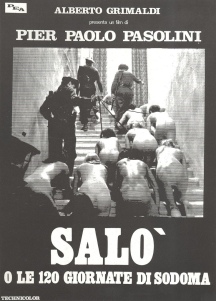 Salò o le 120 giornate di Sodoma (Salò, or the 120 Days of Sodom)
Salò o le 120 giornate di Sodoma (Salò, or the 120 Days of Sodom)
Directed by Pier Paolo Pasolini
Written by Pier Paolo Pasolini and Sergio Citti
Italy, 1975
IMDB | allrovi
Reviewed by Rachel
First Viewing
Synopsis:
Four Italian Fascist libertines kidnap eighteen teenagers and take them to an isolated mansion. Over the course of a few months, they subject the teenagers to violence, torture and sadistic and humiliating sex acts.
120 Days of Sodom’s Top Five Fetishes
5. Public sex
Turned on in a crowded room? Grab a partner!
4. Biastophilia (Rape)
The less said, the better…
3. Voyeurism
Why do all the work yourself when you can watch someone be tortured and still have fun!
2. Urolagnia (Urination fetish)
It’s thirsty work, all this debauchery.
1. Coprophagia (Eating of faeces)
Just imagine it’s chocolate cake and you’ll be fine.
Thoughts:
After viewing Salo I decided to read up on it a bit. Not to alter my view, but to read various interpretations and opinions on a rather unique watch. Salo does seem to be a film that reviewers feel passionate about, whether they are hailing it as a modern masterpiece or denouncing it as something utterly vile and unwatchable. Whatever the viewer feels after watching Salo, be thankful that it wasn’t more faithful to the Marquis de Sade’s book, which is ten times worse.
Overall, I wasn’t sure what to make of this controversial piece. The trouble with a film that features so many metaphors is that the true subjects and points tend to get lost, especially when the imagery has so much shock value. When initially faced with viewing a scene in which a roomful of people eat human faeces, the thought “I’ll bet this a metaphor for junk food” is going to be quite far from one’s mind. Call me lowbrow…
However I do, tentatively, admit that a re-watch may be beneficial. The points raised on post-war dehumanisation, sexual revolution, mass-production and consumerism are still valid, and excellent food for thought. Let me rephrase that…
Duck Soup
 75. Duck Soup
75. Duck Soup
Directed by Leo McCarey
Written by Bert Kalmar and Harry Ruby
USA, 1933
IMDB | allrovi
Reviewed by Ally
Umpteenth viewing
Synopsis:
Wealthy dowager Mrs. Teasdale (Margaret Dumont) promises to bail out the small, bankrupt country of Freedonia, on the proviso that Rufus T. Firefly (Groucho Marx) is appointed leader. Trentino (Louis Calhern) — ambassador of neighbouring country Sylvania — tries to gain control of Freedonia by stirring a revolution, sending Chicolini and Pinky (Chico and Harpo Marx) to spy on Firefly, and wooing Mrs. Teasdale. A series of disagreements between Trentino and Firefly plunge the countries into war.
Not that any of it really matters. The main thing is, it’s funny!
Essential Scene:
Trentino consults his spies, the inexplicably Italian Chicolini and the inexplicably mute Pinky. The mischievous pair proceed to wreak havoc in Trentino’s office.
Trentino’s secretary brings in a telegram. Pinky rushes over, grabs it, then screws it up furiously. Chicolini explains: “He gets mad because he can’t read.”
Trentino gives Pinky a cigar. He tries to light it with the telephone receiver. When that fails, he magically produces a blowtorch from his coat pocket.
They eventually get down to business.
Trentino: Now gentlemen, please, will you tell me what you found out about Firefly?
Chicolini: Well, you remember you gave us a picture of this man and said follow him?
Trentino: Oh yes.
Chicolini: Well we get on the job right away. And in the one hour, even less than one hour —
Trentino: Yes?
Chicolini: We lose the pitsh! That’s pretty quick work, eh?
Trentino: But I asked you to dig up something I can use against Firefly. Did you bring me his record?
Exasperated, Trentino flings the record across the room. Pinky pulls a gun from his pocket and shoots the record in midair. Chicolini awards him a cigar, then shuts Trentino’s fingers in the lid of the cigar box.
Trentino: Now Chicolini, I want a full detailed report of your investigation.
Chicolini: Alright, I tell you. Monday, we watch Firefly’s house, but he no come out. He wasn’t home. Tuesday we go to the ball game, but he fool us; he no show up. Wednesday he go to the ball game and we fool him; we no show up. Thursday was a double-header, nobody show up. Friday it rained all day, there was no ball game, so we stayed home, we listened to it over the radio.
Trentino: Then you didn’t shadow Firefly!
Chicolini: Aw, sure we shadow Fire– we shadow him all day.
Trentino: But what day was that?
Chicolini: Shadowday!
Throughout the scene, Pinky has been snipping things with scissors at regular intervals — Trentino’s cigar, his hair, even his coat tails. When the spies finally leave him, Trentino is left with a mousetrap on his fingers, a newspaper glued to his posterior and absolutely no information on Firefly.
Thoughts:
Every time I watch Duck Soup, a different joke stands out to me. This time, it was a scene between Firefly and Pinky. Firefly asks: “Say, who are you anyway?” Pinky responds by rolling up his sleeve to show him a tattoo:
That clears that up…
There is, however, something missing from Duck Soup. It is so densely populated with gags, there was no room for Harpo and Chico’s customary musical interludes. Aside from this minor disappointment, there is nothing I can say against the film. Groucho delivers his trademark insults at breakneck speed, giving Margaret Dumond barely enough time to be shocked before he’s onto the next wisecrack. Chico and Harpo perform their finest piece of slapstick choreography as they torment Edgar Kennedy the lemonade vendor.
Oh, and Zeppo’s in it too…
Then there’s the classic “mirror scene,” in which Pinky disguises himself as Firefly and pretends to be his reflection in a missing mirror. The gag was first used by Charlie Chaplin in 1916, then Max Linder in 1921, but was surely immortalised by the Marx Brothers.
—
Reviewed by Rachel
Umpteenth viewing
Essential Scene:
Mrs. Teasdale welcomes Freedonia’s new leader, Rufus T. Firefly. This scene is a wonderful example of the fast-as-lightning dialogue of Groucho Marx and the straight-woman talents of Margaret Dumont.
Mrs. Teasdale: Oh, Your Excellency! We’ve been expecting you. As chairwoman of the reception committee, I extend the good wishes of every man, woman and child of Freedonia.
Rufus T. Firefly: Never mind that stuff. [He takes out a deck of cards] Take a card.
Mrs. Teasdale: [as she takes one] Card? What will I do with the card?
Rufus T. Firefly: You can keep it. I’ve got fifty-one left. Now what were you saying?
Mrs. Teasdale: As chairwoman of the reception committee, I welcome you with open arms.
Rufus T. Firefly: Is that so? How late do you stay open?
Mrs. Teasdale: I’ve sponsored your appointment because I feel you are the most able statesman in all Freedonia.
Rufus T. Firefly: Well, that covers a lot of ground. Say, you cover a lot of ground, yourself. You better beat it, I hear they’re gonna tear you down and put an office building where you’re standing. You can leave in a taxi, if you can‘t get a taxi, you can leave in a huff. If that’s too soon you can leave in a minute and a huff. D’you know you haven’t stopped talking since I came here? You must’ve been vaccinated with a phonograph needle.
Mrs. Teasdale: The future of Freedonia rests on you. Promise me you’ll follow in the footsteps of my husband.
Rufus T. Firefly: How do you like that? I haven’t been on the job five minutes and she’s making advances to me. Not that I care, but where is your husband?
Mrs. Teasdale: Why, he’s dead.
Rufus T. Firefly: I bet he’s just using that as an excuse.
Mrs. Teasdale: I was with him to the very end.
Rufus T. Firefly: No wonder he passed away.
Mrs. Teasdale: I held him in my arms and kissed him.
Rufus T. Firefly: Oh, I see, then it was murder. Will you marry me? Did he leave you any money? Answer the second question first.
Mrs. Teasdale: He left me his entire fortune!
Rufus T. Firefly: Is that so? Can’t you see what I’m trying to tell you, I love you!
Mrs. Teasdale: Oh, Your Excellency!
Rufus T. Firefly: You’re not so bad yourself.
Thoughts:
I recently put on Duck Soup for my nine-year-old cousin while the rest of the family chatted. His eyes never left the screen, and the adults in the room ended up watching it too; despite trying hard to have a conversation, they were too distracted by Harpo’s antics.
I realised then that the success of the Marxes is due to the fact that their films remain ‘go-to’ films for all generations. Considering the films are all nearing 80 years old, that is an incredible achievement. The plot of Duck Soup is utterly nonsensical, and some of the lines are slightly dated (and occasionally offensive…), but the majority of the Marxes’ verbal and physical gags haven’t aged one bit. If anything, the brothers improve with age, due to the fact they don’t make ’em like that anymore.
M’colleague and I decided not to choose the Mirror Scene as our chosen scene, as it is incredibly well-known and we wanted to give some other elements of the film a bit of an airing, so to speak. However, we both advise that if you want to see an impeccably executed piece of visual comedy, watch the Mirror Scene! (Perhaps even on youtube. ~ Ally)
Glengarry Glen Ross
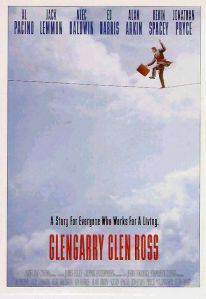 847. Glengarry Glen Ross
847. Glengarry Glen Ross
Directed by James Foley
Written by David Mamet
USA, 1992
IMDB | allmovie
Reviewed by Ally
First viewing
Synopsis:
Four real estate salesmen are supplied with contact details (“leads”) of people who are mostly unable or unwilling to invest in land. Company owners Mitch and Murray send sharkish salesman Blake (Alec Baldwin) to give a motivational talk. He informs the men that only the top two earners will be given the more promising Glengarry leads, and that their jobs are in jeopardy.
Blake: We’re adding a little something to this month’s sales contest. As you all know, first prize is a Cadillac Eldorado. Anybody want to see second prize? Second prize is a set of steak knives. Third prize is you’re fired.
The men are pressurized into using dishonest tactics to close deals and keep their jobs. Shelley Levine (Jack Lemmon), fretting over his poor sales and his sick daughter, attempts to bribe the office manager John Williamson (Kevin Spacey) for better leads. Leading salesman Ricky Roma (Al Pacino) lies to an insecure customer (Jonathan Pryce), hoping to stall him until the cooling-off period is over. Dave Moss (Ed Harris) suggests to George Aaronow (Alan Arkin) that they break into the office, steal the Glengarry leads and sell them to a rival company.
Thoughts:
There are several ways in which Glengarry Glen Ross is impressive. Firstly, it is a successful adaptation of a stage play, adding cinematic interest without sacrificing the appeal of the original play. Secondly, just look at that cast list! And thirdly, it made me sympathize with the very people from whom I dread receiving a call.
The salesmen of Glengarry Glen Ross are con men. They try to sell poor-quality land to people who can ill afford it. Those calls you get, “you have been selected for a special prize” — that’s them. This is the new world of sales, created by opportunists like Blake (Alec Baldwin) who destroyed the bond of trust between salesman and customer. You no longer sell a guy “five cars over fifteen years,” you make a fast buck and run. Bastards, right?
And yet, when Shelley Levine (Jack Lemmon) fails to make yet another sale, my heart breaks a little for him; the ending (which would be my “essential scene” but I decided not to spoil it) breaks what’s left of it. In the impressive ensemble cast, Lemmon’s performance stands out as the best of the film, and one of the best of his career.
Network
This review is dedicated to Sidney Lumet (1924-2011)
~
612. Network
Directed by Sidney Lumet
USA, 1976
IMDB | allmovie
Reviewed by Ally
Approx. fourth viewing
Synopsis:
When veteran newscaster Howard Beale (Peter Finch) learns of his retirement, he has a breakdown live on air and threatens to commit suicide. His best friend, network executive Max Schumacher (William Holden), gives Howard one last chance at a dignified send-off, but he once again stirs controversy with his impassioned ranting. Despite Max’s protestations, programming executive Diana Christensen (Faye Dunaway) decides to exploit Howard’s breakdown, formulating a trashy news show around him, making him “an angry prophet denouncing the hypocrisies of our times.” When viewers start following his bizarre instructions en masse, it becomes clear that Howard is a ratings sensation.
Essential Scene:
Having previously announced his intention to commit suicide live on air, Howard Beale is given one last chance at a dignified on-air send-off. Max Schumacher, executive producer Harry Hunter (Jordan Charney) and the team of directors watch from the control room as Howard once again strays from the script.
Howard Beale: Good evening. Today is Wednesday, September the 24th, and this is my last broadcast. Yesterday I announced on this programme that I was going to commit public suicide, admittedly an act of madness. Well I’ll tell you what happened: I just ran out of bullshit.
Harry Hunter: Cut him off.
Max Schumacher: Leave him on.
The monitor, which had gone black, flicks back to life.
Howard Beale: [aside] Am I still on the air?
Max Schumacher: If this is how he wants to go out, this is how he goes out.
Howard Beale: I really don’t know any other way to say it other than I just ran out of bullshit. Bullshit is all the reasons we give for living. And if we can’t think up any reasons of our own, we always have the God bullshit. We don’t know why we’re going through all this pointless pain, humiliation, decay, so there better be someone somewhere who does know. That’s the God bullshit.
Telephones have been ringing in the control room since Howard first uttered the word “bullshit.” Max answers one of the calls.
Max Schumacher: [on the telephone] He’s saying that life is bullshit, and it is, so what are you screaming about?
Howard Beale: And then, there’s the noble man bullshit; that man is a noble creature that can order his own world; who needs God? Well, if there’s anybody out there that can look around this demented slaughterhouse of a world we live in and tell me that man is a noble creature, believe me: That man is full of bullshit.
The director laughs.
Harry Hunter: What’s so goddamn funny?!
Director: I can’t help it, Harry, it’s funny!
Howard Beale: I don’t have anything going for me. I haven’t got any kids…
Harry Hunter: Max, this is going out live to sixty-seven affiliates.
Max Schumacher: Leave him on.
Howard Beale: …and I was married for thirty-three years of shrill, shrieking fraud…
A secretary bursts into the control room.
Secretary: Mr. Hackett’s trying to get through to you.
Max Schumacher: Tell Mr. Hackett to go fuck himself!
Howard Beale: So I don’t have any bullshit left. I just ran out of it, you see.
Howard finishes his piece and smiles to camera, satisfied.
Thoughts:
Historical perspective changes a film. Nowadays we watch Casablanca safe in the knowledge that the Allies would eventually triumph over the Axis, that Rick and Ilsa’s sacrifice would not have been in vain. It’s hard to imagine how it would have felt to see that film while the war was still being fought. It’s just as hard to imagine a time when Network was, as promised by the poster, “perfectly outrageous.” Many of writer Paddy Chayefsky’s wildest projections have since come to pass, and Network now seems eerily prescient.
Unfortunately, that means it’s also not as funny as it was intended to be. Unhinged ranting on the news? Ho-ho, imagine that! But while the comedy may be diminished, the drama is still powerful. The acting is superb, as I have come to expect from Sidney Lumet films. It’s not a visually enticing film, nor a particularly life-affirming one — in fact, it’s mad as hell. And if Paddy Chayefsky could see how right he was, he’d be madder still.
—
Reviewed by Rachel
First viewing
Essential Scene:
Howard Beale walks in from the rain to give another one of his rants on live television.
He tells his viewing audience that he knows things are bad. People are out of work, kids are running wild, homicides are on the rise. What can we do about it? He doesn’t know exactly. He’s just a TV anchor. But he tells his viewers that for things to change, they must get mad. They must not take it lying down and they must not ignore it.
He tells them to stand up, go to the window, and yell:
I’m mad as hell, and I’m not going to take this any more!
The control room gets excited. They are receiving phone calls from all over their network, saying people are doing exactly what Howard is telling them to do. People are yelling!
Max Schumacher is at home watching the television with his wife Louise and daughter Caroline. Howard rants onscreen:
Stick your head out of the window. Open it, stick your head out and keep yelling, and yell: “I’m mad as hell, and I’m not going to take this any more!”
Caroline stands up and starts to walk towards the window.
Louise: Where are you going?
Caroline: I want to see if anybody’s yelling!
Amongst the thunder and lightning, various people can be heard shouting “I’m as mad as hell, and I’m not going to take this any more!” People are standing on their fire escapes, or leaning out of the window, and they are yelling with all their might.
The power of television.
Thoughts:
Network is very much of its time and can be enjoyed purely as an intelligent satire of ’70s media and politics. But now it additionally serves as a warning we should have heeded.
As a modern audience, we adore when people lose it on television. That’s why the networks brought us reality TV: It’s cheap, it’s full of genuine emotion and often ruins someone’s life. Ratings galore!
The current TV networks even represent every milestone a person can go through. There are live births, extravagant weddings and death-bed ramblings; and it doesn’t stop there. We can now go online and witness some often unspeakable events. Why does this pass for entertainment? Have we become desensitised? Network answered these questions long before we asked them, in a sinisterly familiar manner.
Why the hell didn’t we listen?
—
A sad fascinating fact: One aspect of Network was inspired by Christine Chubbuck, a US TV anchor who committed suicide live on air.
